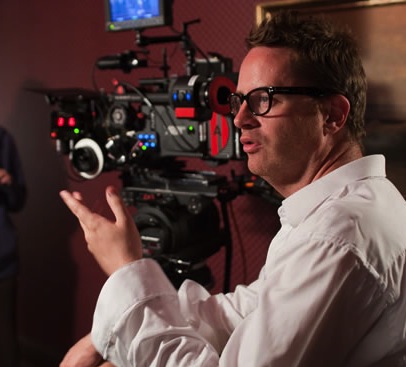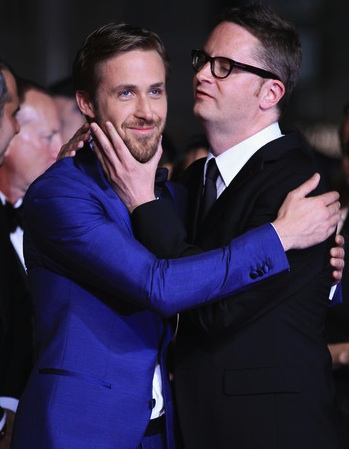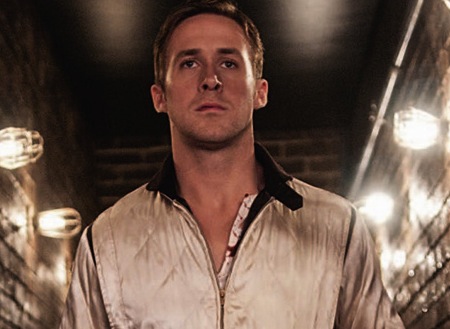 Matt Patches: Los Angeles is very much a character in the movie Being the setting for so many films, why did you want to set Drive in the city?
Matt Patches: Los Angeles is very much a character in the movie Being the setting for so many films, why did you want to set Drive in the city?
Nicolas Winding Refn: I didn’t want to shoot Sunset Boulevard. I didn’t want to shoot all the conventional kind of forms, because you’ve seen that so much—and it’s also not very attractive. What’s really attractive are the other parts of LA, which I find really beautiful and unique and strange and mystical. What’s unique about LA is when you get behind all the clichés, LA never left the ‘80s. You guys are still stuck in the ‘80s! Architecture, and things like that. That’s what I really like about it. So when people say, ‘Oh my God! Your movie had this throwback to the ‘80s!’ Well, I didn’t throw it back. I was actually shooting in the ‘80s.
Did the movie evolve from this realization that Los Angeles is stuck in another decade?
It was born out of an emotion I had driving to Santa Monica with Ryan Gosling to do a movie about a man who drives around at night listening to pop music—that’s his emotional release. He was using that as a basis for everything.
The music is a vital part of this movie, integral to the vibe we see on screen. How do you go about finding the music? Do the ideas from the film come from you listening to music?
Very much. I don’t do drugs anymore. Music is very much like a drug for me. It gives me images in my mind that I would like to see. Not always understanding them, but knowing, ‘This is what I would like to see.’
How do you discover some of the songs? Can you talk about some of the songs that are in the movie, and how you found them?
I have Matt Newman, who edited the movie. He is my in-house editor. He did Bronson for me. We actually met on Miss Marple, when I was broke as hell and needed money. And he was an unknown editor. I hired him for Miss Marple, and he went on and did Bronson for me, [then] we did Valhalla Rising together. Actually, one of my contractual conditions was that I brought Matt Newman over from England to cut the movie at my house. He’s going on to Only God Forgives [Refn’s next film] with me and Ryan, and of course Logan’s Run, and so forth. I always said I wanted an electronic score. He and I would then spend a lot of time figuring out what electronic score would be interesting. Matt is very interested in alternative music and what’s happening in the music world in terms of bands. I’m more just happy finding the greatest hits of Duran Duran. He’s more into what’s happening in the music scene in the corners. He would play various ideas and I would pick the ones I liked. And of course one of them [is] Johnny Jewel, which we had used before in Bronson. And then I had Cliff Martinez (Traffic, Contagion) emulate that sound a lot of the times for his own scores.
 In the film, Ryan Gosling is a very serious, very stoic guy. I don’t know what he’s like in real life, but how did you know he was right for the part and find this character in his abilities.
In the film, Ryan Gosling is a very serious, very stoic guy. I don’t know what he’s like in real life, but how did you know he was right for the part and find this character in his abilities.
In real life, he is very much like me. We are very similar in our sensibilities and our interests. He has the physical strength to stop a fight in the street.
Yeah, I saw!
I just texted him that he’s my hero. But, we’re very telekinetic in a sense.
Really…
We just kind of let it flow and see what happens. Also, I shoot my films in chronological order, which makes it easier for an actor to just deal with what comes to him.
In terms of your relationship working on set: does it involve a lot of asking questions? Or is it all about vibe? It sounds like with telekinesis there might not be a whole lot of talking.
I always say to the actors, keep the energy within. Keep it inside. All inside.
I heard about you guys spending a lot of time together, hanging out at your house, or driving around in a car.
Yeah. We would hang out at my house. We wrote the movie at my house. And we’d drive around at night. My family would come and visit me—unfortunately, they couldn’t live with me—but they would come back and forth. I was very lonely a lot of the nights. I would go for drives to the 101, eat, hang out. We were living the movie. We were living the movie as we were writing it.
That’s amazing. Now with this movie and some of your previous work—Bronson and Valhalla Rising, especially—violence plays a major role It’s not gratuitous, but there are extreme moments of violence. What do these moments of violence mean to you? Why do you find them important to pepper them throughout your films?
I like extreme emotions. I try to visualize extreme emotions through violence. Like the Bible does.
Wow, how do you think that the Bible works, or speaks to that idea?
The Bible shows you consequences of your actions visually.
Are you a religious person?
No. I’m Danish—come on! We believe in pornography. And drinking.
Do you feel like there’s a lot of your Danish sensibility in Drive? Even though this is a movie that takes place in L.A. does your Danish side of you creep out?
No, because I’m not particularly Danish. I have a Danish passport, but I’m a New Yorker by heart. That’s where I grew up.
Oh, excellent! So then I should ask: is there a lot of New York in this movie?
That’s an interesting question. I don’t know. I think, maybe, there’s a lot of New York in the sensibilities of loving concrete and loving urban environments and cities.
There’s a lot of driving in this movie, obviously (it’s in the title), so what goes into a great car chase? Or making driving look as sexy as it does in this movie?
Well, you gotta make every scene that has driving its own self, and not just repeat the same tricks again and again. So, it was like coming up with the fight scenes in Bronson, and how each fight scene would differ the other. Each fight scene has its own character. But they’re quite dull to make. It’s all about logistics. And I didn’t have a lot of money to make these driving scenes, so we had to be really, really on the nose and sparse. There was really no time for experiments. We just kind of shot it… point-of-view, reverse…but things that actually work. So you go with that, and then you try to figure out how you can add a little spice to them. Sound, the sound of the engines, the visuals. And also, don’t make them fly.
Don’t make them fly?
Yeah.
Just like…speed-wise, or what do you mean?
The whole CGI thing, where cars can [fly].
 That’s interesting because the movie does incorporate its own fantastical elements. Something like the elevator scene—lights going dim, they’re in this out of body moment—it’s slightly less realistic. Is it difficult to weave those moments in when you’re trying to keep the movie grounded?
That’s interesting because the movie does incorporate its own fantastical elements. Something like the elevator scene—lights going dim, they’re in this out of body moment—it’s slightly less realistic. Is it difficult to weave those moments in when you’re trying to keep the movie grounded?
No. It was how the movie progressed. It was like a fairy tale. It became more and more about fantasy. And the audience will believe that if they believe the emotions. We’re like Star Wars. If you catch their emotions, people actually believe hyperspace exists.
Valhalla Rising is a very dark, historical film. Something like Drive—it’s elegantly done, but again, it has the violence. So your upcoming Only God Forgives—what kind of genre is that falling into? Or tonally. It doesn’t seem like you want to put yourself in the corner here.
I WILL NOT BE CONTROLLED. Well, you know, I’ve always wanted to do a Western.
You wanna do a Western?
…In Asia. So I thought, I’ll do Only God Forgives there.
Gotcha. Are you going to shoot that on location in Bangkok?
Absolutely. Shoot in Bangkok. Moving to Bangkok in four weeks.
Wow! Is that an exciting thing? I’ve never been.
It’s f*ckin’ awesome. Been there five years in a row. We go on vacations—my family—there each year.
So, tonally speaking, how will you approach it? Like Valhalla Rising: very dark—and [Drive] is very glamorous or slick at points. What is the tone going to be like for this new one?
Well, Bangkok reminds me very much of Blade Runner.
That makes sense. So will it have that rainy, blooming lights kind of feel?
No, it’s actually the exact opposite. It’s gigantic, beautiful, lights, buildings…everything is lit up. Like a sci-fi world.
And scope-wise, is this a bigger film? I see a kind of progression—Drive feels like a bigger production than Valhalla Rising or Bronson. Is that the direction in which you feel like you’re going?
Oh, no. Only God Forgives is cheaper. But that’s because I’m shooting in Asia. Drive was a little more expensive because I wanted to shoot in Los Angeles. That itself is very expensive. Shooting Valhalla Rising, it was the same thing. And doing Bronson. Drive was shot in seven weeks. Bronson was shot in five weeks. Valhalla Rising was shot in seven weeks. So, it’s a shooting scenario that I’m accustomed to. I’m looking forward to the day where I actually have more than eight weeks to shoot a film.
Well, that might be Logan’s Run.
I expect nothing else. All that money!
Do you think you’ll still have the same control if you start doing more studio-driven work? Or is that part of the deal?
When you’re that level, it’s a different game, a different league you’re in. Things have to be financially successful. You have to respect that and understand that. But then, that becomes the trick: how do you make your movie against all obstacles?
I wish you the best on that. It might be difficult.
You never know!
You can contact Matt Patches directly on Twitter @misterpatches and remember to follow@Hollywood_com!


